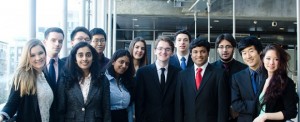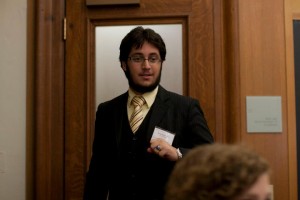Why do you MUN? You might have been asked this question a lot. Maybe you have an entire speech prepared on what Model UN means to you. Maybe MUN is the subject of all of your college applications. It was for mine.
Or maybe you’ve never given the idea a second thought. Maybe you’ve never even considered what you would utter in response to such a question.
Like I said before – MUN was the subject of many a college essay of mine, about thirteen short months ago, when I was applying for admission to various universities across the nation. Thus, I should not have been all too surprised when I was asked the question during almost every one of my interviews.
Let me give you a bit more background on myself. I love Model United Nations. I’ve been a delegate for almost five years now, and MUN is such a big part of my life that I couldn’t imagine a time where I didn’t refer to others as country names, wear a badge on my lapel, sport western business attire, and motion incessantly. Although I know that Model UN and I are pretty much partners for life, I chose to apply to study mechanical engineering because I had (and still have) a dream of building a spaceship.
Naturally, my application drew some questions. A prospective mechanical engineer who wrote almost entirely about Model United Nations and her love for diplomacy and international relations? Please explain. So I did.
I do Model United Nations because I want to be a part of the solution. MUN provides me with the means to work towards common goals, by providing the background, perspective, and insights on a plethora of current global issues. Additionally, it allows me to improve my ability to write and give speeches, collaborate and communicate across written and spoken fronts, and to debate and come to a diplomatic solution to the problems that are to be resolved.
As an engineer, I do Model United Nations for the same reasons. Engineers need to be able to communicate effectively with other engineers, and with clientele. We need to know how to explain our product and work to others from different fields, and to ensure full transparency between all members of a project.
Engineers work to create solutions for the problems of our developing world which is similar if not identical to the aim of the United Nations, which is geared towards ensuring health, peace, productivity, and sustainability in our developing community. We must learn about the current problems that exist throughout the world so that we can attain enough background knowledge to begin working on creating viable solutions that benefit those in need without inconveniencing others.
The issues of the International Atomic Energy Agency, of the World Health Organization, those on the topic of cybersecurity, on health, disease, sustainability, on recovery from natural disaster such as earthquakes, and an endless list of topics that are debated intensely in committee are the very same problems that engineers strive to resolve. The safety of nuclear power plants, the protection of our digital information, the prevention and elimination of malaria, the rebuilding of cities after Hurricane Katrina, and others are common MUN topics that hold an equal importance in the world of engineering.
Now, as a biomedical engineering student at Columbia University, MUN is still one of the largest and most important aspects of my life. I was not giving up anything when I chose to continue Model UN in college as an engineer, in fact, I was gaining something. MUN benefits me as an engineer just as much as it benefits those studying international relations and political science, because I am exposed to the same global issues that I will strive to solve, through a means of debate, diplomacy, communication, and collaboration that resembles any committee session.
Model United Nations isn’t just for political science majors. It also isn’t just for engineers. It’s the one activity that I believe truly encompasses all ideals, all areas of study and work, and every aspect of our lives. Model United Nations provides us with common goals for bettering the lives of ourselves and of others and for preparing for a better future, and it gives us the diplomatic and collaborative skills and mindset that we need in order to make our resolutions succeed.




